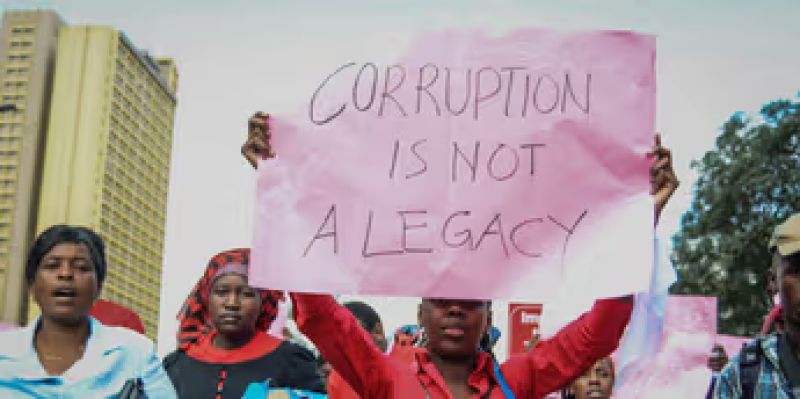Discover the devastating effects of corruption in Africa, ongoing anti-corruption efforts, and potential solutions for a brighter future in the continent.

Corruption in Africa: A Deep-Rooted Challenge, but Hope Remains
Corruption is the abuse of entrusted power for personal gain. It ranges from Bribery and embezzlement to nepotism and the manipulation of public resources for private benefit are all forms of corruption.
Unfortunately, Africa has a long and complex history with corruption, with the continent consistently ranking high in global corruption indices.
Fighting corruption in Africa requires strengthening institutions like judiciaries and anti-corruption agencies to uphold the rule of law and deterring misconduct.
Impact of corruption in Africa
The consequences of corruption are far-reaching, impacting both social development and economic growth. Lets take a closer look
Societal Impact of Corruption in Africa
Corruption's detrimental effects on social development are numerous:
Poverty: When resources meant for public services like education and healthcare are diverted through corrupt practices, the most vulnerable suffer the most.
Inequality: Corruption exacerbates existing inequalities. The wealthy and well-connected often exploit the system to their advantage, accumulating wealth and influence at the expense of the disadvantaged.
Lack of Trust: When institutions and individuals entrusted with public good engage in corrupt practices, trust in authority erodes.
Economic Impact of Corruption in Africa
Corruption acts as a significant barrier to economic growth in several ways:
Discourages Investment: The unpredictability and unfairness created by corrupt practices discourages long-term investment, hindering economic diversification and job creation.
Hinders Economic Growth: Public funds meant for development projects are siphoned off for personal gain, leading to inefficient resource allocation and stunted economic growth.
Undermines Business Environment: Businesses that thrive through bribes and connections gain an undue advantage, stifling the growth of honest and competitive enterprises.
Anti-Corruption Efforts in Africa
Corruption is a significant challenge that hinders socio-economic development in many African countries. However, in recent years, there have been many efforts across the continent to combat this menace.
Regional Economic Communities (RECs)
The African Union Advisory Board on Corruption (AUABC) has focused on promoting stronger collaboration and harmonization of efforts among and with the Regional Economic Communities (RECs) through enhanced cooperation and promoting synergies around anti-corruption interventions on the continent.
The AUABC convened the 2021 African Anti-Corruption Dialogue virtually under the theme: “Regional Economic Communities: Critical Actors in the Implementation of the African Union Convention on Preventing and Combating Corruption”
Civil Society Organizations
Civil society organizations play a crucial role in the fight against corruption. The Africa Anti-Corruption Platform provides a platform for these organizations to showcase their work, particularly around the UN Convention against Corruption (UNCAC) and its review process.
These organizations share their work, coordinate advocacy activities, update each other on relevant developments, and learn from each other’s experiences.
Public Sector Initiatives
These initiatives aim to curb corruption in the public sector, which is often a significant source of corruption in many African countries. Most african countries have infrastructure and organizations in place to combat corruption in the public sector.
On a national level, countries like Ghana, Nigeria and so on, have adopted anti-corruption initiatives to curb corruption in their public administration.
Despite having a rich democratic history, Ghana seems to be retrogressing in the fight against corruption. Therefore, it has implemented several initiatives to improve the current status quo.
Ongoing Efforts Against Corruption in Some African Countries
Despite the challenges, several African countries are demonstrating progress in their anti-corruption endeavors:
Rwanda: Rwanda's success in curbing corruption is often cited, attributed to strong leadership, a zero-tolerance policy, and efficient institutions.
Botswana: Botswana has a long-standing reputation for good governance and low levels of corruption, partly due to its independent judiciary and robust anti-corruption mechanisms.
Ghana: Ghana's Special Prosecutor's Office has actively pursued high-profile corruption cases, sending a strong message of accountability.
Kenya: Kenya's implementation of digital platforms for public service delivery has helped reduce opportunities for bribery and bureaucratic struggles.
Conclusion
Though the significant challenges remain, the growing efforts against corruption across the continent offer a beam of hope. Countries like Rwanda, Botswana, Ghana, and Kenya demonstrate the potential for progress through strong leadership, robust anti-corruption mechanisms, and a commitment to transparency.
The combined efforts of governments, civil society, and international organizations are crucial in building a future where transparent and accountable governance empowers African nations to thrive.

